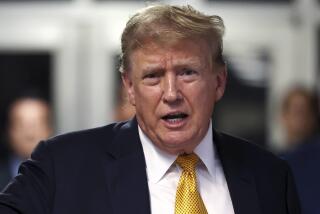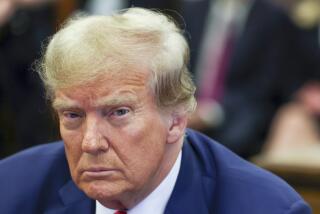Imelda Marcos’ Attorneys Won’t Call Any Witnesses : Law: The defense says prosecutors failed to prove the fraud and racketeering charges. The judge expects jury deliberations to begin next week.
- Share via
NEW YORK — Attorneys for Imelda Marcos announced that they would not call witnesses in her defense after federal prosecutors rested their fraud and racketeering case against the former Philippine first lady Tuesday.
With no defense case for either Marcos or co-defendant Adnan Khashoggi, the stage is set for jury deliberations to begin next week after final arguments by all sides.
The decision by Marcos’ lawyers was a surprise to some.
Defense attorney Gerry Spence had told jurors in April during his opening statement that he would present evidence that the CIA and the White House knew about and encouraged her late husband, former dictator Ferdinand E. Marcos, to stash funds overseas and make other secret investments in U.S. real estate.
No such evidence was introduced during the government’s case, however, making it unlikely it can be argued in final statements next week.
“It’s our view that the government failed to make its case,” Spence said. “You only call witnesses when you have a case to rebut.”
After the jury was dismissed for the rest of the week, Assistant U.S. Atty. Charles LaBella shook hands with some of the defense lawyers, but he would not comment about the case.
A number of legal arguments remain to be resolved, but closing arguments were scheduled for the first three days of next week. U.S. District Judge John Keenan told jurors they could expect to be deliberating before the end of next week.
The 95th and final witness--attorney Jeffrey Greenbaum, representing the Philippine government in a civil lawsuit--testified earlier Tuesday that Khashoggi had tried to negotiate a settlement with Manila in 1987 that would have had the government of Corazon Aquino pay the Saudi financier more than $15 million. In return, Khashoggi would have turned over New York buildings and art that the Philippines claims had been stolen by the Marcoses.
Khashoggi is accused of fraud and obstructing justice in helping the Marcoses try to dispose of art and property. A court order forbidding sale or transfer of Marcos properties in the United States had been issued a few days after the dictator’s 20-year rule ended in a revolution early in 1986.
The government’s case against Imelda Marcos focused on allegations of fraud that began with bribes, kickbacks, embezzlement and coercion during her husband’s regime, the proceeds from which were exported to the United States. Prosecutors said the violations began while the Marcoses were in power and continued after they fled to exile in the United States.
Conviction on the racketeering charges would make much of Imelda Marcos’ assets subject to forfeiture. The Justice Department has said funds seized from her would be returned to the victims of the alleged fraud, the Philippine government and two U.S. banks.
If convicted, she also faces up to 20 years in jail on each of two racketeering counts and five years each on fraud and obstruction of justice charges. Khashoggi, charged with two counts of fraud and obstruction of justice, faces up to five years in prison.
More to Read
Sign up for Essential California
The most important California stories and recommendations in your inbox every morning.
You may occasionally receive promotional content from the Los Angeles Times.










